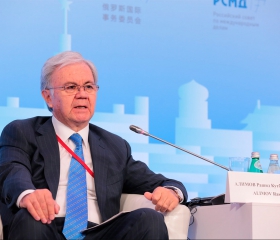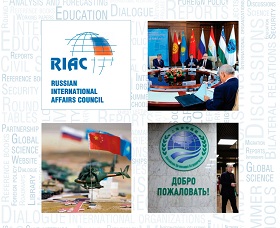The meeting of the heads of states of Shanghai Cooperation Organisation (SCO) member states has been gaining momentum in recent years as a regional – and indeed global – discussion platform. This is testament to the growing potential and credibility of the organization. In the rapidly changing global environment, and amidst new challenges and threats, it is imperative that the SCO develop a coordinated position on the key issues of security and international development, not only so that it can determine its own activities going forward, but also in the context of the entire Eurasian space.
The meeting of the heads of states of Shanghai Cooperation Organisation (SCO) member states has been gaining momentum in recent years as a regional – and indeed global – discussion platform. This is testament to the growing potential and credibility of the organization. In the rapidly changing global environment, and amidst new challenges and threats, it is imperative that the SCO develop a coordinated position on the key issues of security and international development, not only so that it can determine its own activities going forward, but also in the context of the entire Eurasian space.
The recent SCO Summit in Tashkent marking the 15th anniversary of the organization’s founding was no exception. In addition to the heads of state of the SCO member states, the summit was attended by the heads of state and top government officials of observer countries, as well as by the President of Turkmenistan, who was there as the official guest of the organizers. The international portion of the summit was presented by the Deputy Secretary-General of the United Nations, the Executive Secretary of the Commonwealth of Independent States (CIS), the Secretary General of the Collective Security Treaty Organization (CSTO), the Secretary General of the Association of Southeast Asian Nations (ASEAN) and the Executive Director of the Conference on Interaction and Confidence Building Measures in Asia (CICA).
Having given the heads of state an opportunity to reflect upon the results of the past few years, the Declaration adopted at the Summit noted that the organization had grown into a significant and influential player on the international arena (link in Russian). This has been achieved above all thanks to the meticulous, and often difficult joint work to ensure the effective functioning of the SCO’s structural bodies, and to the creation of a solid normative and legal basis for the organization’s activities. Among the pillars of the relations among the six SCO member states are the Treaty on Long-Term Good-Neighborliness, Friendship and Cooperation and specific agreements and arrangements on the main areas of cooperation in politics, security, economics, countering new threats, etc.
The signing of the Memorandum on the Obligations of India and Pakistan for becoming SCO member states was a landmark event that took place in Tashkent (link in Russian). The final phase of their accession to the organization was thus launched. It also reaffirmed the positive dynamics of the SCO’s development achieved at previous summits, particularly those held in Dushanbe in 2014 and Ufa in 2015. Delaying the process would come at a heavy price for the organization, in terms of its image and the potential political consequences. In the best-case scenario, the next SCO meeting may involve talks about transforming the current Shanghai Six into the Shanghai Seven, or even the Shanghai Eight.
Granting New Delhi and Islamabad the status of full SCO member states in the near future will boost the organization’s potential and provide a fresh impetus to further securing its role on the regional and international arena, particularly when it comes to solving real issues of security and sustainable growth. At the same time, marking the concrete outlines of the evolution of the Shanghai Six is not only an important step in the organization’s development, but it is also a serious challenge. Above all, this will involve ensuring security in the new conditions, as well as improving the effectiveness of all (some three dozen) cooperation mechanisms in politics, security, economics, the humanities, etc. During his speech, President of the Russian Federation Vladimir Putin talked candidly about the feasibility of working closely right now to include India and Pakistan in the mechanisms of operational interaction within the SCO (link in Russian). Next in line with their applications to join the SCO are Iran and Afghanistan (link in Russian). And while the presidents of the SCO member states reiterated the fact that the organization was open to new members joining, the two countries remain on the waiting list. In the context of increasing the membership of the SCO, the declared intention to develop the organization’s international ties as fully as possible – improving existing contacts and initiating new ones – takes on a completely new dimension.
As far as the organization’s immediate future is concerned, the statement that the organization already has all the prerequisites to move onto a new level of cooperation, especially in terms of reaching a qualitative results, is particularly noteworthy. The adoption in Ufa last year of the first Five-Year Plan for the Implementation of the SCO Development Strategy until 2025 is significant in this respect. The fact that special attention will be paid to this aspect of the SCO’s activity in the near term gives it additional significance, particularly in light of India and Pakistan’s impending accession to the organization. The objectivity and effectiveness of political interaction among the SCO member states in the forthcoming new configuration of the Shanghai Six will have to pass a maturity test, in particular with regard to the protracted Afghan issue, where political efforts have been expended to resolve this problem on the basis of a consolidated position of the SCO members in support of reconciliation within the country carried out by the Afghan people themselves under their guidance. It is imperative that peace and stability be achieved as quickly as possible if stability is to be strengthened throughout the entire region as well.
In light of the inviolability of the SCO’s basic priorities – fighting terrorism, separatism, extremism and drug trafficking – the heads of state reaffirmed their firm intention to develop close cooperation in this area. As far as security is concerned, the Anti-Drugs Strategy for the next five years has yet to be approved; the Convention on the Fight against Extremism needs to be developed; large-scale measures on the implementation of the next Programme on Cooperation in the Fight Against Terrorism, Separatism and Extremism for 2016–2018 have to be implemented; and the annual Action Plan for the Joint Fight against Crime has to be signed.
The economic component of the Summit, which until recently lagged seriously behind the main track, deserves special attention. Recent trends in global and regional economic management, as well as large-scale initiatives in the geo-economic dimension of the Eurasian space (the Eurasian Economic Union, or EAEU, and the Silk Road Economic Belt), make it all the more important for the SCO to find a political and economic niche within these processes. Especially because they directly affect the fundamental interests of all the SCO member states. The initiatives put forward by President Putin at the recent St. Petersburg International Economic Form with regard to a large-scale Eurasian partnership involving the EAEU, China, India, Pakistan and Iran may be promising in this regard (link in Russian).
The heads of state of the SCO member countries reaffirmed their support for the Silk Road Economic Belt. They also reiterated the significance of last year’s inter-governmental agreements on the active use of the economic potential of the organization’s developments. These include infrastructural and industrial construction, transport and communication projects, and activities to develop and finance joint projects. At the same time, the intention to seek the convergence of the national development strategies of the member states and coordinate their trade and economic programmes. It has become the norm in recent years for bilateral and trilateral meetings to be held as part of Shanghai Cooperation Organisation summits, with participants sharing notes on the current state of relations and developing concrete proposals for their further development. In addition to the now traditional meetings of the leaders of Russia, China and Mongolia, other useful contacts were also developed in Tashkent.
Following the Summit in Tashkent, the presidency of the SCO was taken up by Kazakhstan (presidency of the organization rotates alphabetically in accordance with the Russian script), which will announce its priorities for the coming period soon. Given the long-term nature of new challenges and threats to regional and international stability, security will remain a key priority for the organization. At the same time, the political and economic aspect of the SCO’s activity will gain prominence, especially if we take new global economic development trends (which are gaining momentum) into account.






